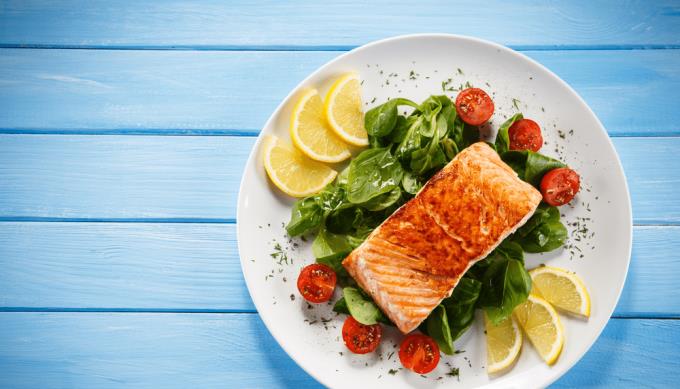Losing the little angel in the womb is something no one wants, even if the pregnancy is just beginning. So, knowing what a miscarriage woman should eat or knowing the foods that cause the miscarriage will help you get the best preparation for the next pregnancy.
In addition to the emotional support, the miscarriage woman also needs the right nutrition because at this point, your body is very weak. That's why problems like miscarriage to eat and what to avoid help women not only recover, but also prevent future miscarriages.
What should a woman with miscarriage eat?

A miscarriage can cause bleeding and dizziness, making you feel much more tired than usual. Food absorbed during this time also has the potential to affect health.
Here are some foods to help you answer the question of what to eat:
1. Iron-rich foods
As aFamilyToday Health mentioned above, miscarriage can cause heavy bleeding, which in turn leads to a decrease in iron levels in the body. You are even more likely to have anemia and related symptoms caused by a miscarriage. Fatigue is common after a miscarriage. Therefore, you should increase your intake of iron-rich foods .
The best iron to consume after a miscarriage is heme iron because it's so easily absorbed. Lean meat is considered a good source of this good iron, so you can choose meats like beef, chicken, lean pork and cook for your taste. However, avoid using the fatty form of frying that should be boiled and steamed to keep the most nutrients.
Some other iron-rich foods include:
Beans such as lentils, soybeans;
Green vegetables like water spinach;
Brussels cabbage;
Raisins;
Dried peaches;
Pumpkin seeds;
Brown rice;
Black Chocolate;
Molasses.
Besides prioritizing iron-rich foods, try to learn and prepare foods rich in vitamin C because they help the body absorb iron better. Some fruits such as papaya, strawberries and grapefruit should be included in the daily diet of miscarriage women.
2. Calcium-rich foods
During pregnancy, the body's calcium reserves can drastically decrease. That is why it is so important to take a calcium-rich food supplement in preparation for your next pregnancy.
Some sources of calcium you can easily find include:
Milk and dairy products like low-fat cheese;
Seafood like salmon and sardines;
Dry fruit;
Okra;
Dark green leafy vegetables.
3. Magnesium-rich foods
The sadness of a loss can cause you to fall into depression, and each person will feel and feel the pain differently. You can add magnesium-rich foods to your menu to help restore your depression, including foods like:
Bean
Nuts
Chocolate
Magnesium not only helps you deal with depression, but also helps with energy production for the body, restoring cells, and supporting nerve and muscle function.
4. Fruits and vegetables
For the question of what a miscarriage should eat, fruits and vegetables are indispensable food groups. You need to consume large amounts of fruits and vegetables to get the nutrients your body needs after a miscarriage.
In addition, fresh fruits and vegetables can be processed into appetizing snacks such as salads, smoothies, juices, and fruit yogurts in case a miscarriage woman does not want to overeat during a meal. .
However, please wash the ingredients before starting to do so to avoid harmful bacteria.
Miscarriage women should abstain from what?

A healthy diet doesn't mean just prioritizing nutritious foods, but also avoiding unhealthy foods. Therefore, in addition to finding out what miscarriage should eat, you should also note to limit some of the following foods.
1. Foods rich in starch but low in fiber
Carbohydrates provide the body with the necessary energy and maintain stable blood sugar control. However, refined grains containing less fiber can cause many harm, such as causing sudden changes in blood sugar, weight gain ...
Therefore, try to limit carbohydrates that are low in fiber.They include:
Instant noodles;
Egg;
Cookies.
2. Sweets
Sweet foods are delicious, but sometimes they are not good for your body, especially the period after a miscarriage because blood sugar changes suddenly.
Therefore, limit foods high in sugar such as:
Soft drink;
Cake;
Candy;
Snacks
3. Fatty milk and meat
After a miscarriage, pregnant mothers should avoid foods such as fatty milk, fatty meat because they will create an environment that causes inflammation to develop, thereby making you feel tired and painful. These foods may include:
Whole fresh milk;
Fatty beef, pork, and sheep;
Fat cheese.
4. Soy products
Soybeans contain many healthy nutrients, but at the same time are fairly high in phytate. Phytate can prevent your body from absorbing iron. So, limit soy products after miscarriage.
In addition to the food groups above, you should also avoid raw or fermented foods to avoid infections, such as:
Soft cheese;
Unpasteurized dairy products;
Raw meat, raw fish;
Sushi;
Salad.
In addition, according to MayoClinic , you should also limit your drinking coffee and should not drink alcohol if you want to have a healthy pregnancy.
Miscarriage has a lot of negative effects both physically and mentally, you can feel sad, but don't take what you eat lightly because the female's body needs a lot of energy to recover.
Hopefully you have a clear understanding of what to eat and what to eat with this article. Wish you get pregnant soon after miscarriage and welcome the little angel to the family!













